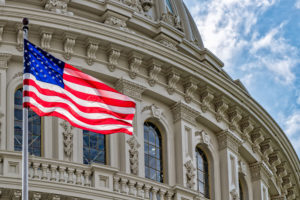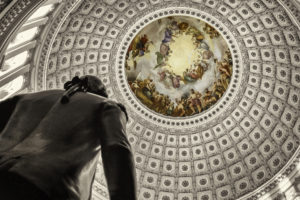
The CFPB plans to reconsider its Obama-era payday lending rule, HHS establishes a division to support the conscience and religious rights of health care providers, and more…
IN THE NEWS
- The Consumer Financial Protection Bureau (CFPB) announced plans to reconsider its controversial Obama-era payday lending rule, which requires lenders to determine that customers can afford the loans they take out. U.S. Senator Mark Warner (D-Va.) said in a tweet that “this decision to undermine it is bad for consumers.” Richard Hunt, president and chief executive officer of the Consumer Bankers Association called this decision “welcomed news for millions of American consumers experiencing financial hardship and in need of small-dollar credit.”
- The U.S. Department of Health and Human Services (HHS) established a Conscience and Religious Freedom Division within its Office for Civil Rights (OCR) “to more vigorously and effectively enforce existing laws protecting the rights of conscience and religious freedom.” “Conscience protections” allow health care providers to decline certain procedures, like abortions, “on religious or moral grounds.” OCR Director Roger Severino explained, “No one should be forced to choose between helping sick people and living by one’s deepest moral or religious convictions.” But Senator Patty Murray (D-Wash.) condemned the action as “a tool to restrict access to health care for people who are transgender and women.”
- Mick Mulvaney, the Acting Director of the CFPB announced that the Bureau will “critically examine its policies and practices to ensure they align with the Bureau’s statutory mandate.” The CFPB said it will be seeking comment on the Bureau’s enforcement, supervision, rulemaking, market monitoring, and education activities.
- Senate Democrats said they have 50 votes for a Congressional Review Act resolution to overturn the Federal Communications Commission’s (FCC) repeal of net neutrality. Additionally, Attorneys General from 22 states sued the FCC over its repeal of net neutrality. New York Attorney General Eric Schneiderman (D) said of the suit, “An open Internet—and the free exchange of ideas it allows—is critical to our democratic processes.”
- Ajit Pai, Chairman of the FCC, said an erroneous missile alert broadcasted throughout Hawaii on Saturday “was absolutely unacceptable.” Pai said that the FCC, which helps regulate emergency alerts, is looking into the cause of the “incident” and noted “that the government of Hawaii did not have reasonable safeguards or process controls in place.”
- At a meeting of The Economic Club of Washington, D.C., U.S. Secretary of the Treasury Steven Mnuchin highlighted the U.S. Department of the Treasury’s oversight of cryptocurrencies, such as Bitcoin, noting the Treasury Department’s concern that individuals may try to use cryptocurrencies for money laundering. Mnuchin said that the Treasury Department “wants to make sure that bad people cannot use these currencies to do bad things.”
- The U.S. Department of Education published a final rule removing “outdated, superseded regulations for five programs no longer administered by the Department” in compliance with Executive Order 13,777, which governs how agencies go about modifying and cutting regulations. In 2014, these programs were transferred to HHS.
- Phil Murphy (D-N.J.) fulfilled a campaign pledge by signing an executive order promoting equal pay for women in New Jersey. Under Executive Order 1, “state agencies and offices are explicitly prohibited from asking a job applicant for their past wage history, or investigating the prior salaries of their applicants.” Murphy deemed the action “the first meaningful step towards gender equity and fighting the gender pay gap.”
- Peter DeFazio (D-Ore.) and Michael E. Capuano (D-Mass.) wrote a letter to Richard Anderson, the president and chief executive officer of Amtrak, asking for details on Amtrak’s efforts to strengthen its “safety culture.” The letter follows the December 2017 Amtrak derailment in Washington State. DeFazio and Capuano claimed that Amtrak has “weak safety management” and noted past shortcomings Amtrak has had with National Transportation Safety Board expectations. DeFazio and Capuano also introduced in the House last week a bill that would help fund technology to make trains safer.
WHAT WE’RE READING THIS WEEK
- In an article for the Brookings Institution, John Hudak, Deputy Director of the Center for Effective Public Management at Brookings, discussed the consequences of U.S. Attorney General Jeff Sessions’s rescission of the Cole Memo—guidance that allowed states to implement their own marijuana laws without federal enforcement. Hudak argued that this decision “will allow, once again, the black market to flourish” and “eats into the same Department of Justice budget that could be spent fighting terrorism” or “dealing with the opioid epidemic.”
- In a recent paper, David Driesen of Syracuse University College of Law argued that, in considering executive orders, courts should use arbitrary and capricious review, which requires reasoned decision-making. Driesen contended that, because the President is not subject to the Administrative Procedure Act when handing down executive orders, arbitrary and capricious review “fills the gap” and “ensures that the President faithfully executes the law” when issuing executive orders.
- Advocates for Highway and Auto Safety polled just over 1,000 American adults to conclude that “widespread concern” exists over driverless cars. The poll revealed that more than 60 percent of those polled “express concern about sharing the road with driverless cars” and that three out of five of those polled do not support Congress allowing for driverless cars that do not satisfy safety regulations.



